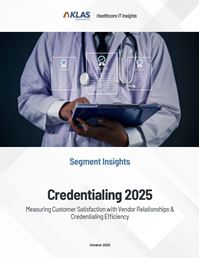 2026 BEST IN KLAS
2026 BEST IN KLAS
Preferences
Related Series
Related Segments


Credentialing 2022
What Solutions Have Fulfilled Their Efficiency Promise?
Credentialing management has historically required dozens of spreadsheets, manual data entry, and painstaking monitoring of multiple payer, state, and national databases—causing significant inefficiencies and expenses. Vendors providing credentialing software and/or services promise major efficiency gains for healthcare organizations, but not all offerings are equally effective. This report examines three strong predictors of efficiency—the use of automations, strong credentialing workflows, and vendor partnership/guidance—to determine how well vendors are living up to their promises.
How Vendors Deliver Credentialing Offerings
While vendors have different approaches to credentialing or serve different segments of the market, they all share the same goal—to enable and support provider organizations’ credentialing processes. To the right is an overview of measured vendors’ offerings and customer bases.

ASM & Modio Health Reduce Turnaround Times, Consolidate Tracking;
RLDatix’s Strong Automation & Services Drive Satisfaction

Industry-Wide, Workflows Need Improvement;
Customers of symplr & VerityStream (Limited Data) Struggle Most Due to Poor Training

Silversheet (Limited Data) Struggles to Eliminate Manual Work for Customers;
New VerityStream (Limited Data) Platform Requires Significant Work to Build Useful Automations

Document Autofill, Virtual Committee & License Verification Automations Drive Most Satisfaction
Regardless of vendor, customer respondents who report using automations for document filling, virtual committees, and license verification are significantly more likely to report positive outcomes and say their vendor has improved their efficiency. Automations with room for improvement are also generally consistent across vendors; state-license verification, entity cloning, and status tracking are common pain points.

Modio Health & RLDatix (Limited Data) Stand Out with Strong Guidance;
QGenda (Limited Data) Also Shows Promise

About This Report
Each year, KLAS interviews thousands of healthcare professionals about the IT solutions and services their organizations use. KLAS’ standard quantitative evaluations for healthcare software and services are composed of numeric ratings questions and yes/no questions, all weighted equally. Combined, the ratings for these questions make up the overall performance score, which is measured on a 100-point scale. The questions are organized into six customer experience pillars for software (culture, loyalty, operations, product, relationship, and value) and five pillars for services (loyalty, operations, relationship, services, and value). These standard ratings are available on the KLAS website.
For this study, KLAS created a supplemental evaluation to understand how vendors perform in several areas that are key to the credentialing market. KLAS asked interviewed participants about several areas highly connected to increasing efficiency (the main outcome expected), including solution features aimed at efficiency improvement, their vendor’s ability to provide guidance and best practices, and the strengths and weaknesses in their solution’s various automations. The data was collected over the last 12 months.

Sample Sizes
Sample sizes displayed throughout this report (e.g., n=16) represent the total number of unique customer organizations interviewed for a given vendor or solution. However, it should be noted that to allow for the representation of differing perspectives within any one customer organization, samples may include surveys from different individuals at the same organization. The table below shows the total number of unique organizations interviewed for each vendor or solution as well as the total number of individual respondents.
Some respondents choose not to answer particular questions, meaning the sample size for any given vendor or solution can change from question to question. When the number of unique organization responses for a particular question is less than 15, the score for that question is marked with an asterisk (*) or otherwise designated as “limited data.” If the sample size is less than 6, no score is shown. Note that when a vendor has a low number of reporting sites, the possibility exists for KLAS scores to change significantly as new surveys are collected.
Product Designations Used in This Report
- Mostly ambulatory [A]: Product for which the majority of respondents are associated with ambulatory care
- Primarily services: Offering based mainly in professional services (rather than software alone)
Writer
Natalie Hopkins

Designer
Jessica Bonnett

Project Manager
Ethan Lui
This material is copyrighted. Any organization gaining unauthorized access to this report will be liable to compensate KLAS for the full retail price. Please see the KLAS DATA USE POLICY for information regarding use of this report. © 2026 KLAS Research, LLC. All Rights Reserved. NOTE: Performance scores may change significantly when including newly interviewed provider organizations, especially when added to a smaller sample size like in emerging markets with a small number of live clients. The findings presented are not meant to be conclusive data for an entire client base.






